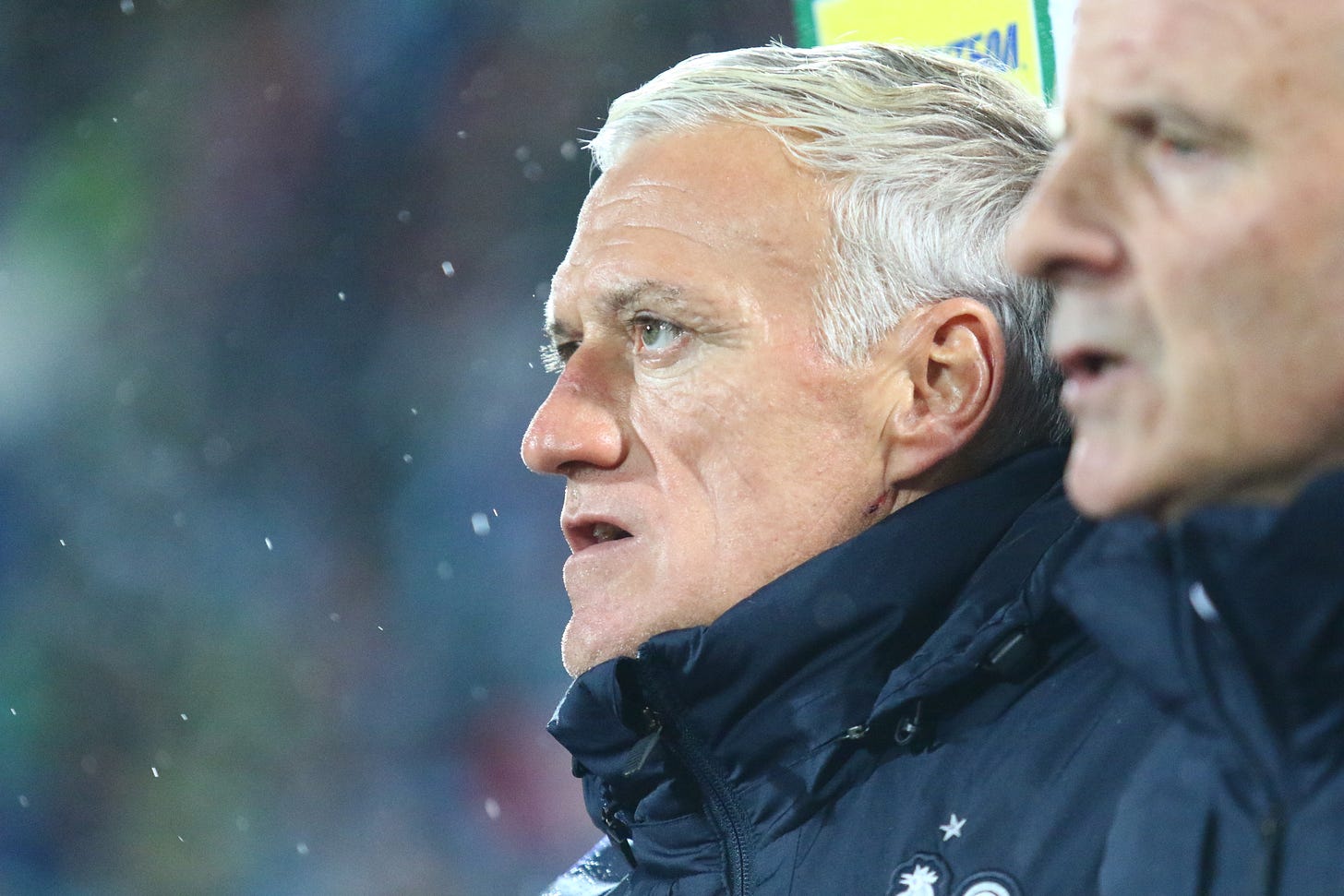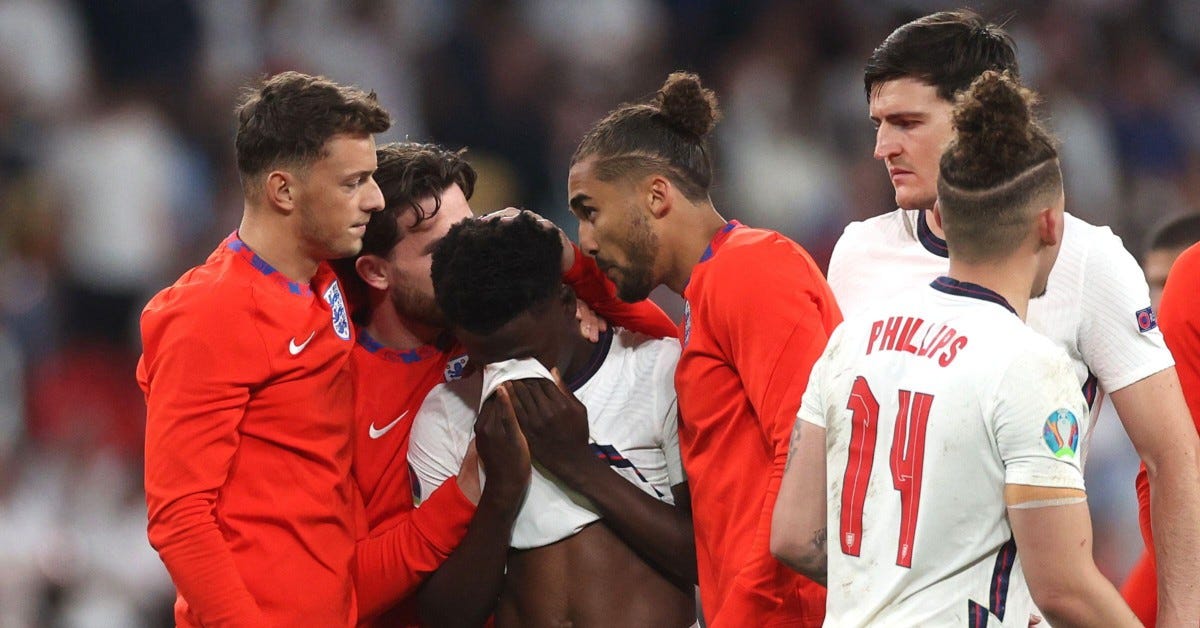Why are teams still failing to mentally prepare for penalties?
With shootouts deciding around 20-25% of knockout games, why are some sides still ignoring the psychology behind spot kicks?
You’re the manager of a national football team that has lost its last three penalty shootouts. You’re about to enter the knockout stages of a tournament where roughly 1 in 4 of the remaining games will be decided after the end of extra time. You’re up against sides who have armed their penalty taker ‘protectors’ with academic research on tactics employed by nightclub bouncers. You continue to insist that shootouts are a lottery which you can’t train for.
To some extent, you have to admire Didier Deschamps’ instransigence. The French coach’s pre-Euro 2024 assertion, made in response to calls from French Football Federation technical director Hubert Fournier for the national team to establish a dedicated plan for penalties, was emphatic. Forget the data. Pack away the Power BI app. Penalties are the preserve of those who have won a World Cup (and by the way, he happens to have two of those).
“[Penalties are] always the same: it’s a balance of power between the shooter and keeper,” said Deschamps, in a pre-tournament press conference.
“It’s not that I consider that it cannot be worked on, but I am convinced – and my past as a player gives me this information – that it is impossible to recreate a situation, on a psychological level, between training and a match the feeling of extra time.”
Deschamps’ insight into the pressure placed on penalty takers is, of course, invaluable. I will never take a spot kick in front of a sold out Wembley (or, if we’re being more topical, Olympiastadion Berlin). Experts who have devoted years to analysing the art (and science) of penalties are similarly simulating, hypothesising and predicting (based, it should be said, on stats stripped from thousands of hours of shootout footage).
And yet, and you can see where this is going, it’s also a convenient crutch to fall back on. In a gradual arc spanning some 50 years, football teams have gradually been cottoning onto the fact that you can train to be better at penalties. Over the course of the last half century, sides have started to analyse breathing rates, deploy visualuation techniques and (as mentioned earlier) equip the players now ‘guarding’ penalty takers with tactics taken straight from the steps of nightclubs.
Which begs the question: why are some sides still wedded to Deschamps’ school of thought?
The Mind Room is a reader-supported publication. To receive new posts and support my work, consider becoming a free or paid subscriber.
It’s a question I asked Norwegian psychology professor Geir Jordet, during a recent Mind Room podcast. Jordet, who has spent over two decades advising top European clubs and has literally written a book on this very subject, says the answer lies in that familiar sporting cocktail of denial and opportunism.
'We're throwing players into a stress cage without protecting them': why football needs to mentally prepare players for penalties
Geir Jordet has spent most of his professional career studying penalties. The Norwegian professor, who has worked with several of Europe's top teams over two decades in football, knows the psychological subtleties of spot kicks as well as anyone. All of which means that, as Euro 2024 moves towards the knockout stages and the drama of penalty shootouts, …
“Coaches are the eternal opportunists: they want to win the game in regular time and so because three fourths of (knockout) matches don't go to penalties, they put all the focus on the game itself,” explained Jordet.
“There’s also this narrative that penalties are a lottery that you can't really train for and although it's true that there's a big chance element with penalties, more than the game itself, of course there are things you can do.
“The issue is that people tend to not have knowledge about what to do, so it's easier to use the lottery narrative.
“Also, coaches don't want to expose their players to talking about penalty kicks because they have this idea that, if they do that, they will start to develop anxiety and dread and worry, and it will be something that kind of spins around in their heads.
“Of course, by not addressing this, you're committing the ultimate escape act, which is then also carried over to the event itself. You see so many avoidance behaviors in the penalty shootout, and it starts with the coach who basically doesn’t practice it because they don't want players to deal with it.”
Penalty strategy sceptics might reasonably point to some of the unintended consequences of tactics trotted out over the last few years. Jordet highlighted the heightened tension surrounding some of the spot kicks in the 2022 World Cup, where penalty taker ‘protectors’ (the ‘bouncers’ chosen to prevent opposition players from unnerving teammates preparing to take a penalty) inadvertently incited more pushing and pulling with overenthusiastic attempts to guard the likes of Kane, Lewandowski and Messi.
But, even here, innovation is trumping inertia. Kieffer Moore’s consciously friendly demeanour in the build up to Gareth Bale’s successful spot kick against the USA in Qatar helped extinguish the protests and finger pointing which typically accompany a a penalty. As Jordet puts it:
“When Wales were awarded the penalty, he (Moore) came in with a giant smile and just deescalated everything, protecting Gareth Bale (the penalty taker) in such an effective manner that, to me, he’s like the role model of the penalty taker protector.”
All of which isn’t to say that Deschamps should immediately instruct Olivier Giroud to precede Kylian Mbappe’s penalties with a winning smile (although, if anyone could compete with Moore, you suspect Giroud would be among the prime candidates).
But it does show, surely, that there are simple steps that every side should be taking to psychologically prepare (and protect) players, that coaches can help to mitigate the risk inherently involved in any shootout and that the days of the lottery narrative are numbered.
Questions?
If you have any queries about the newsletter, get in touch by emailing mindroomenquiries@gmail.com.
Previous articles
New subscriber or looking for access to the back catalogue of Mind Room articles? You can access all of the stories, covering everything from AC Milan’s neuroscience lab to the way English rugby teams are embracing ‘shared mental models’, by becoming a Mind Room Member and gaining access to the four sections of the site:
Thanks again for reading The Mind Room!


